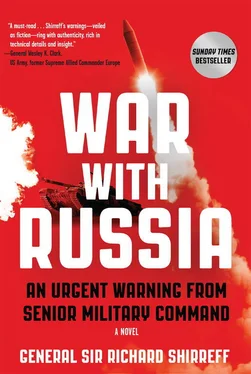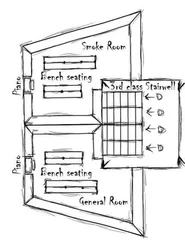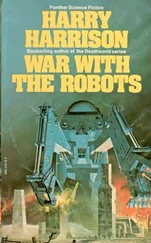“And if this were not enough, we have seen unprecedented military activity on the borders of Latvia and our Baltic neighbors. Our history tells us never to trust Russia. It was Count Shuvalov, a Russian who was Governor General of what were then the Baltic Provinces in the Tsarist Empire one hundred and fifty years ago, who said, and I quote: ‘The historical mission of the Baltic provinces is to serve as a battlefield for the problems of the highest politics in Europe.’ Please, my fellow ambassadors, we have no desire to be Russia’s battlefield once again!”
He stopped, overcome with emotion. He had the attention of all.
“Our memories are long. Latvia has only existed as a sovereign state for two decades between the world wars of the last century and once again since 1991. So, we are all too aware of the fate which is in store for us if we fail to deter the Russians this time. We firmly believe that, unless NATO declares an Article Five emergency and provides immediate military, diplomatic and political support to Latvia, Estonia and Lithuania, then Russia will attempt to take over the Baltic states. Secretary General, I call upon the allies to accept that an attack is taking place on Latvia right now and therefore to agree to implement Article Five.”
He stopped, sighed, took off his spectacles and sat back. Silence reigned in the NAC Chamber. After a pause, Secretary General Kostilek called upon the Estonian and then the Lithuanian ambassadors to speak. Both spoke in turn, equally eloquently and equally persuasively.
Kostilek turned to the Chairman of the Military Committee. “General Vahr, can I ask for the advice of the NATO military authorities, please.”
“Secretary General, I regret that the Military Committee is unable to agree a common line due to different views among nations. I therefore propose we ask DSACEUR for his military advice.”
Kostilek nodded and turned to McKinlay. “General, the floor is yours.”
McKinlay cleared his throat. “Thank you, Secretary General. In line with the direction of the NAC, the NATO military authorities have spent much time considering the nature of Article Five in the twenty-first century. We recognize the dangers of viewing it through Cold War spectacles. So, ladies and gentlemen, we must no longer think of an attack on a NATO member in terms of massed Soviet tanks invading across the Inner German Border, or biting off a chunk of northern Norway, as we did back in the Cold War days. This means the Latvian ambassador is right. The military assessment is that what we are seeing is a new form of state-on-state war in which, gradually, the Russians will ramp up the pressure on the target state, in this case Latvia, while remaining under the threshold of what would traditionally generate an Article Five response from NATO. The best way to stop this crisis from getting out of control is to meet the Russians with strength.”
He looked around the table. This was clearly not what the majority of ambassadors wanted to hear.
He continued. “I have, of course, discussed this with SACEUR in Washington and his view is unequivocal. This is the gravest situation that has faced NATO in recent years. SACEUR and I believe that we are closer to war than at any stage in its history. Some might say, ‘What about the Cuban missile crisis?’ My response would be that, even at the height of that crisis, Soviet Politburo decisions were colored by memories of their twenty-six million war-dead from the Great Patriotic War. There is a new generation in the Kremlin who have not learned these lessons the hard way. We are now up against an adversary which integrates nuclear weapons into every aspect of its war-fighting doctrine and is prepared to use them. Any miscalculation could lead to an outbreak of fighting between NATO forces and the Russians. And because Russia will be able to concentrate stronger conventional forces than NATO, that increases the risk that once Russia has defeated us in the Baltic states, the President will resort to what he calls ‘nuclear de-escalation.’”
McKinlay stopped for a moment, conscious of the confusion on the faces of some ambassadors. “Ladies and gentlemen, you’re right. There’s a nasty paradox here. What the Russians call nuclear de-escalation, we call nuclear blackmail. It’s no more than the President saying to us, ‘Try and retake the Baltic states and I’ll nuke you.’ We stop and he calls it de-escalation.
“So, to avoid getting to this, we must deter any aggression in the first place and that means demonstrating strength and resolve in the Baltic states. You will recall that we already have the Standing NATO Mine Countermeasures Group operating in the Baltic and it will be in Riga shortly for a long-planned port visit; that is fortunate timing. However, we need to demonstrate NATO’s absolute commitment to collective defense by the immediate deployment of the Very High Readiness Joint Task Force to the three Baltic states. That deployment should be followed by the sea, land and air components of the NATO Response Force. Meanwhile, ACTORD—for the uninitiated among you and in NATO acronyms, ‘Activation Order’—should be declared by SACEUR in order to initiate the deployment of NATO headquarters and forces. You should be aware that this will also release the necessary NATO common funding to pay for the deployment.
“SACEUR’s and my unequivocal advice is that, by sending a strong signal of NATO resolve right now, we may force the Russians to think twice before proceeding further against the Baltics. NATO would, emphatically, not be attacking Russia by doing this. But by stationing multinational NATO forces in these countries, Russia will be in no doubt that an attack on one would truly be an attack on all. I know I must avoid making any political comment but let me finish by telling you what any soldier who has studied his profession will tell you… Wars are caused by weakness. History teaches us that, time and time again, aggressors attack when they think they can get one over their adversary. Russia is militarily stronger than it has been for a long time. NATO weaker. Our conclusion is that this is one such moment. That is why we give the advice we do.”
Secretary General Kostilek then gave the floor to the ambassadors. Successively, the US, UK, Poland, Norway and Denmark supported the proposal. France came to the support of its old ally Poland. Most of the southern Europeans stayed silent; unwilling to support the proposal, but equally unwilling to cross the USA.
More encouraging than I had hoped for , thought McKinlay. We may even get a positive decision pretty quickly.
Then the bulky German ambassador, appetite for lunch entirely unsatisfied by a small bar of chocolate, took the floor; bombastic, loud and aggressive.
“Germany cannot accept this military advice under any circumstances. Not only have the NATO Military Authorities broken procedure by not declaring Activation Warning before Activation Order, but we also believe that such a deployment by NATO will be seen as a provocation by Russia and lead to precisely the situation we are seeking to avoid. No. There can be no deployment of the Very High Readiness Joint Task Force and certainly no deployment of the NATO Response Force, yet. Germany insists that all the political means of defusing this crisis must be brought to bear before going down a path which could lead to a major war in Europe.”
McKinlay could now see from the relief on the faces around the table that the German view had many supporters, and not only from the southern Europeans. The Greek ambassador was next. Unshaven in his leather jacket, McKinlay noted he was today sporting a gold earring, along with the gold medallion visible above his T-shirt.
“After the saga of the Euro and Germany’s overbearing attitude and lack of understanding for the problems faced by Greece, I am surprised to find myself in agreement with the German ambassador.”
Читать дальше












